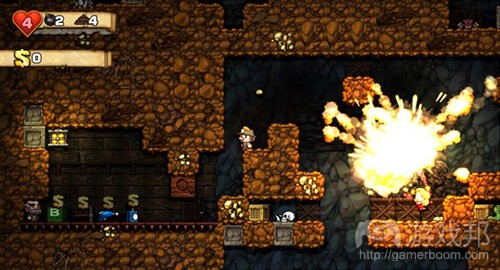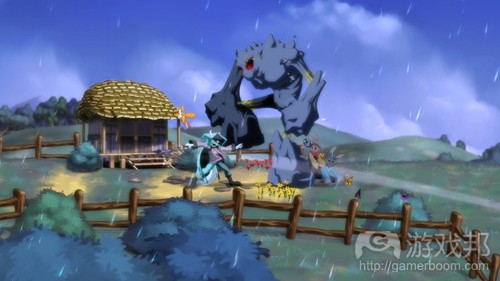独立游戏开发者谈2012年的挑战和经验
作者:Colin Campbell
最近,我与几位知名独立游戏开发者谈话,分享对独立游戏来说非凡的一年的感受。考虑到独立游戏借助游戏机、手机和PC的数字推广渠道,从小众市场走向大众市场,我们将部分谈话的焦点置于其他小开发团队能有所借鉴和参考的内容上。
那么,在今年推广游戏的过程中,他们都学到了什么呢?他们如何获得成功?
保持独立精神
Derek Yu是成功的洞穴探索游戏《Spelunky》的开发者,他认为,今年在游戏宣传推广这个核心问题上有了很大进步。“对于小团队,资金和营销一直是大问题。所幸的是,随着更多欢迎独立游戏的渠道开放,困难得到缓解了。”
但容易得到也意味着竞争激烈。他补充道:“现在更困难的事,大概是如何让游戏如何在更加拥挤、成功和商业化的领域中发出自己的声音。我觉得,这种环境已经对小开发者造成很大压力,迫使他们过分关注赚钱和拿奖。”
他希望独立精神能保持自身的纯洁性,不与主流商业游戏开发的过程和动机同流合污。“独立游戏的崛起和成功是好事,但我要谨慎地不让它影响我制作游戏的初衷。一定要记住,为什么这些‘小’游戏当初为什么能获得这么大的成功——因为我们对它们投入了满满的爱心和精力。”
不要沦为成功的奴隶
作为《Super Meat Boy》团队的一员和《The Binding of Isaac》的开发者,Edmund McMillen很关注这个问题。他表示:“现在最大的挑战是,不要落入追逐一时成功的心态中。你不能太担心游戏是否成功,而要专注于把游戏做好,只要游戏做好了,游戏粉丝就在那里。如果你太担心如何销售游戏,或目标玩家是谁,那么你从一开始就是搬石头砸自己的脚,因为你的想法会让自己陷入预算很大的大工作室才会有的心态中。”
勇于尝试创意想法
thechineseroom的Dan Pinchbeck制作了岛屿探索游戏《Dear Esther》。他表示:“我收到很多小团队的邮件,要我看看他们的游戏,或征询我对Steam的建议等。他们的问题真的很难回答——看完东西然后提出好建立是件费时间的事,而我现在根本没什么时间。得到关注确实非常非常难,因为市场竞争太激烈了。 Greenlight或IGF 或Indiecade已经把标杆立得非常高了,所以那些中等水平的游戏将越来越难生存。”
“我认为现在最大的挑战是,做一款脱离俗套,标新立异的游戏,这也是最快脱颖而出的唯一办法。只有大想法、风险、创新才有这样的回报——复制和模仿是不会成功的。所以,做点完全不同的事吧。”
把游戏做得有趣
Steve Gaynor正在制作The Fullbright Company的点击类游戏《Gone Home》,这款游戏吸引了大量媒体的关注,颇受好评。“最大的挑战永远是,做一款真正有趣、所有人都想玩的游戏。这才是进入游戏业的价值所在,对吧?”
但仍然有许多现实考虑,甚至对于那些有大想法的人,如“有足够的钱维持你制作游戏”。Gaynor表示:“这个问题的解决办法比以前多了,比如向Kickstarter和Indie Fund等集体融资网站求助,但放弃你的全职工作,把时间花在制作游戏上,仍然是一件难得的事。”
广而告之
Dean Dodrill是幻想横版冒险游戏《Dust: An Elysian Tail》的开发者,这款游戏于今年在Xbox 360上发布了。他认为:“钱和动机永远是问题,并且二者往往交织在一起。另外,我看到不少多人的团队解散得很快。”
他补充道:“但是,我认为营销才是最大的障碍。最糟的事是,没有人谈论你的游戏。甚至差评也比没有评论好。大型发行商花百万美元用于发布工作是有原因的,而作为独立开发者,我们得自己搞营销。就这方面,我从《Dust》中吸取了一些有价值的经验,我希望在以后的游戏中能做得更好。当我开始搞开发时,我低估了自己作为发行者和营销者的作用。”(本文为游戏邦/gamerboom.com编译,拒绝任何不保留版权的转载,如需转载请联系:游戏邦)
Indies met challenges, learned lessons in 2012
By Colin Campbell
Recently, I spoke to a number of well-known independent game developers to find out if they too shared the sense that this has been an extraordinary year for indie games. Part of that conversation focused on the lessons other small teams might learn, as indie games move from niche to mass-market, via digital distribution hubs on consoles, mobile and PC.
What have they learned this year as they strove to get their games noticed? How have they been able to find success?
Maintain the indie spirit
Derek Yu, creator cave-exploration hit Spelunky says this year has seen a big improvement in the core issue of getting games out there. “Funding and distribution have always been a big issue for small teams but thankfully that’s becoming better as more indie-friendly channels open up,” he says.
But ease-of-access brings greater competition. “What’s maybe more difficult these days is finding your own voice amid an increasingly crowded, successful and commercial field,” Yu adds. “I feel like that environment has put a lot of pressure on small developers to focus too much on making money and winning awards.”
He wants the indie spirit to remain different from the processes and motivations that drive mainstream commercial game development. “The rise and success of indie gaming has been wonderful to watch and be a part of, but I’m wary of letting it affect my reasons for making games,” he says. “It’s really important to remember why these ‘small’ games made such a big splash in the first place — because we put a lot of love and care into them.”
Don’t be a hit-chaser
This challenge also concerns Edmund McMillen, part of Super Meat Boy’s Team Meat and creator of The Binding of Isaac. He says, “The biggest challenge now is simply not falling into the mindframe of trying to make a hit. You can’t worry that much about your game’s success, just focus on making the game good and your fan base will be there for you when it’s done. If you start worrying too much about how to sell your game, or who your target audience is you are shooting yourself in the foot from the start because it’s these kind of thoughts that push you into the mindframe of a large budget studio with big money on the line.”
Go for the risky Big Idea
Dan Pinchbeck of thechineseroom created the island-exploration experience Dear Esther (pictured at top). He says, “I get a lot of emails now from small teams asking me to look at their games, or for advice for getting on Steam, or whatever. It’s really hard to answer those questions — it takes a long time to look over something and give good advice, which I just don’t have right now, and getting attention is really, really tough because the market is just so flooded. The quality bar to get picked up by Greenlight or IGF or Indiecade or press outlets is high as hell now, so those middleground titles are going to struggle increasingly.
“I think right now, the biggest challenge is making a game that shoots way over mediocre into super-amazing, as that’s really the only way you are going to get the kind of escape velocity you need to start being noticed. This is a time when big ideas, risk, innovation will pay off — clones and variations are not going to make it. And that’s a good thing really. So make something completely brilliant and do radical things.”
Make it truly interesting
Steve Gaynor is working on The Fullbright Company’s point-and-click mystery Gone Home, which has attracted a lot of positive media attention. “The biggest challenge will always be making a truly interesting game that a lot of people want to play. That’s the price of entry, right?”
But there are still plenty of practical concerns, even for those with great ideas, such as “having enough money to keep you going long enough to get the game made,” says Gaynor. “There are more options than ever for this too, like Kickstarter and Indie Fund, but it’s still a rare thing to be able to drop your day job and put the time required into building a thing.”
Get the word out
Dean Dodrill is the creator of fantasy side-scrolling adventure Dust: An Elysian Tail which released this year for Xbox 360. He says, “There’s always the issue of money and self-motivation and often enough, the two are related. Also, I see a lot of multi-person teams fall apart very early.”
He adds, “However, I think marketing will always be the biggest hurdle. The worst thing that can happen to your game is to have no one talking about it. Even bad publicity is better than nothing. There’s a reason large publishers pump millions of dollars into their launches, and it’s up to us, as indies, to get the word out. I learned some valuable lessons with Dust regarding this, and I hope to do better with future titles. When I started development, I underestimated my role as publicist and marketer.” (source:gamasutra)
下一篇:如何创造优秀的视觉小说游戏









































 闽公网安备35020302001549号
闽公网安备35020302001549号